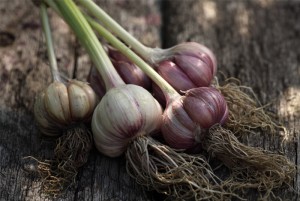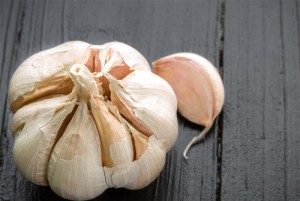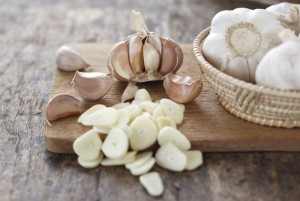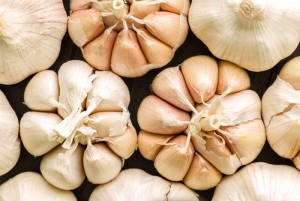When most people think of garlic, they think of culinary deliciousness: the fragrant smells of French and Italian food emitted from sautéing garlic in butter or when it’s infused in olive oil.
Sometimes bad breath and vampires creep into our thoughts!
But what about the health benefits?
Garlic has many. It is even considered to be medicine by many alternative health practitioners.
This plant is part of the onion family (allium).
Today, it is grown or being imported all over the world.

Garlic History
In ancient times, many cultures used garlic as medicine.
In India and China, it was used as an aid in digestion, breathing problems, and to fight parasitic infections. (1)
Garlic was referenced in Canon of Medicine as having a compound that works against “arthritis, toothache, chronic cough, constipation, parasitic infestation, snake and insect bites, and gynecologic diseases, as well as in infectious diseases (as antibiotic).” (1)
The use of garlic became more common in Medieval times and is still a popular remedy for many ailments.
The plant grows up to four feet high and is of the bulbous plant family.
Garlic bulbs, or the head, contain about 10-20 cloves.
Allicin is the main component of garlic that has healing properties.
It is produced when garlic is broken, either sliced or crushed, and the enzyme is activated.
Health Benefits of Garlic
Medicinal Elements
Although garlic does not typically serve as a major source of essential nutrients, it may contribute to several dietary factors with potential health benefits.
These include the presence of oligosaccharides, arginine-rich proteins, and, depending on soil and growing conditions, selenium and flavonoids.
According to the Journal of Nutrition, “Countless studies have demonstrated the value of vegetables and fruits in the prevention of cancer and heart disease…
As research advances, it is apparent that many vegetables and fruits have antioxidant capabilities and, as mentioned, the effects are often synergistic rather than additive.
Such agents influence inflammation, differentiation, and many other basic ailments.
The anti-cancer effects of phytochemicals are increasingly recognized as complex and multifactorial.” (2)
Good for Your Metabolism
The nervous system is the major communication network in the human body.
Its normal functioning is strongly dependent on the maintenance of its structural integrity and many complex metabolic processes.
Neurological disease can be a result of malnutrition or mal-absorption, which then lead to bigger neurological problems.
The central nervous system controls all bodily functions, degenerative diseases that affect the brain, the spine, and the spinal cord.
The neurodegenerative disorders include Alzheimer’s Disease, Parkinson’s Disease, and more.
While Alzheimer’s Disease is the most common neurodegenerative disorder, one of the main culprits happens when the nervous system is overridden with bad cholesterol. (3)
Garlic is now being used for its ability to lower cholesterol in smaller animals.
“A number of studies have similarly shown that garlic and garlic preparations significantly reduced plasma lipids, especially total cholesterol and LDL-cholesterol in humans…
Animal studies have shown that supplementation of garlic in the diet depressed the hepatic activities of lipogenic and cholesterogenic enzymes.” (3)
Subjects with cardiovascular disease have shown positive results when taking even as little as 1g of garlic every day.
There has been a reduction in clots, tumors, and other cell degeneration.
The property of garlic rich in antioxidants fights the free radicals that promote cancer in human and animal subjects.
By helping to remove these toxins, the body is less susceptible to cell retardation.

Anti-Cancer Properties
Cancer is the leading disease for Americans.
Studies have shown that ingesting 5 grams of garlic every day blocks the excretion of nitropoline—an enzyme that helps to retard cancer cells.
One study claims: “Preclinical models provide rather compelling evidence that garlic and its associated components can lower the incidence of breast, colon, skin, uterine, esophagus, and lung cancers.
Suppression of nitrosamine formation continues to surface as one of the most likely mechanisms by which garlic retards cancer.” (4)
Evidence has also supported garlic’s ability to inhibit tumors and other agents that are responsible for causing cancer.
“Many studies have been conducted that show that garlic also provides various anti-tumor effects.
In rodents, garlic and its constituents have been reported to inhibit the development of chemically induced tumors in the liver colon, prostate, mammary gland, esophagus, lung, skin, and stomach.
Such positive research has also included tumor cell growth inhibition and chemopreventive effects.”(1)
The National Cancer Institute stated: “Several population studies show an association between increased intake of garlic and reduced risk of certain cancers including cancers of the stomach, colon, esophagus, pancreas, and breast.” (5)
Boosts the Immune System
Consuming garlic is one way to give your immune system an extra boost.
With high antioxidants, garlic helps to eliminate free radicals and sickness-causing toxins.
One 12-week study of 140 randomized volunteers confirmed that garlic (or allicin supplements) has an adverse effect on the common cold.
In fact, colds were reduced by more than 60% in the volunteers who received garlic.
The other group that received a placebo recorded worse symptoms of the cold and had more complaints in their daily diary.(6)
The volunteers who received the garlic capsule had symptoms of a less severe degree for shorter amounts of time (1.5 days).
The volunteers receiving the placebo found that they had the cold for longer periods of time (5 days) and more frequently in the months of November to February – when the survey was conducted.
A similar study reported that doubling the dosage of garlic reduced the number of sick days by another 61% (7).
If you want to avoid getting sick or decrease the severity of your sickness, add garlic to your diet or take a supplement capsule in order to fight the common cold or winter flu.
During World War II, garlic was also employed to fight gangrene.
The boost in the immune system fights off infection and one of the methods used was the making of garlic tea: steeping chopped garlic in hot water.
Raw garlic was also placed on wounds to stops the spread of infection.

Fights High Blood Pressure
Garlic gains much praise and recognition for its treatment and prevention of heart-related disease.
Garlic consumption has been proven in the scientific world to have positive effects by lowering blood pressure.
“Several clinical studies, beginning in 1979 until 2013, have shown that garlic reduced blood pressure in more than 80% of patients suffering from high blood.” (1)
An investigation studying the effects of garlic on 47 hypertensive patients found that garlic decreased the blood pressure by 12 mmHg.
One of the positives of garlic is that it is natural and does not have adverse effects that other medicine has on your body.
Similar studies, in which patients have taken 200 mg of garlic powder three times daily, showed a reduction of diastolic blood pressure. (8)
As cardiovascular disease kills hundred of thousands of people every year, this is a very inexpensive addition to your diet that may help with hypertension.
If you feel compelled to eat meat and fat-heavy or fried foods, adding garlic to the dish will at least work against some of the low-density fats you are adding to your body.
Anti-Microbial Effects of Garlic
For centuries, garlic has been cited as a useful agent to fight infectious diseases.
In 1858, Louis Pasteur noted the antibacterial effect of allium against many fast-reproducing bacteria.
“These include Salmonella, Escherichia coli, Staphylococcus aureus, Escherichia coli, Salmonella, Klebsiella, Micrococcus, Bacillus subtulis, Clostridium, Mycobacterium, and Helicobacter.” (1)
Allicin, the active antibacterial compound in garlic, modifies the ability of bacteria to reproduce and prevents them from spreading.
One way to prevent E. coli in your cooking is by using raw garlic as a rub for all meats—the powerful antibiotic agent in garlic will kill those germs.
The same can be done with salads – using raw garlic in dressings may save you from spoiled spinach or lettuce.
Antiplaque Properties
In addition to antibacterial properties, garlic has also shown strong evidence of fighting human dental plaque microbiota.
Garlic acts similar to the pharmaceutical ciprofloxacin (used to fight infections in the mouth).
Historically, cavities and mouth infections were also combatted by chewing on a whole clove. (1)
“Several studies have shown that the extract was effective against a host of protozoa including Candida albicans, the main plaque agent in the mouth and yeast infection causing bacteria, and many other bacteria.”
Garlic is a very good replacement for heavy antibiotics that can weaken the immune system and leave patients open to other infections and bacteria. (1)
Rich in Antioxidants
Antioxidants work against the free radials that retard cells and cause ageing in the body.
Toxin build-up directly influences diseases such as cardiovascular, degenerative, and cancer.
Aged garlic extract (AGE) is renowned for preventing the oxidation of the cells that makes them harmful.
“AGE protects DNA against free radical–mediated damage and mutations, inhibits multistep carcinogenesis and defends against ionizing radiation and UV-induced damage, including protection against some forms of UV-induced immunosuppression.” (9)
As a result, aged garlic extract is responsible for protecting the brain from memory loss, losing motor and neuron controls in the brain, and helping with longevity.
The higher the dosage of AGE, the more antioxidants the body receives, thus diminishing stress.
This works to stop degenerative diseases such as Alzheimer’s, high blood pressure, and cancer.

May Elongate Life Expectancy
As life expectancy is constantly changing, there are too many variables to obtain a precise reason for this; it is hard to say if garlic increases the body’s longevity.
However, the positives garlic brings to the table by eliminating free radicals, slowing the degenerative disease, fighting cancerous cells, and lowering blood pressure all contribute to life longevity in humans and tested animals.
By helping to keep humans from obtaining the common cold and reducing the severity of its symptoms, garlic puts less stress on the body.
May Increase Athletic Performance
Garlic has been used as an enhancement by athletes for thousands of years.
There are records that ancient Greeks and the first Olympians took a few spoons of crushed garlic before competing.(1)
In the medieval times, laborers were given garlic to help fight fatigue.
The reason for this is that garlic works to reduce your heart rate, allowing more blood to get to your muscles and, as a result, allow your body to perform better.
The Society for heart research says: “Subjects with heart disease that took garlic oil for 6 weeks had a reduction in peak heart rate of 12% and improved their exercise capacity (10)”.
So next time you’re training for a marathon or getting ready to hit the gym, add some raw garlic to your meal beforehand and note the difference.
Proven Detoxifying Food
One element present in garlic is sulfur—hence the unique smell.
Besides being high in antioxidants, garlic has been shown to help rid the body if toxic metals (besides free radicals).
The sulfuric compound in garlic works to protect the body against metal damage.
A study was conducted on laborers of a car battery plant.
They complained of headaches and suffered from clinically high blood pressure.
For four weeks, the participants were given 3 doses of garlic every day, which resulted in almost a 20% reduction of lead in their blood (11).
Allicin and selenium both work to protect the liver from free radicals, alleviating stress on the organs.

May Increase Estrogen Levels in Menopausal Women
As women get older, they often have to bear in mind the loss of calcium and possibility of osteoporosis.
Studies on mice have shown that there is a correlation between calcium and osteoporosis.
However, rodent studies have also shown that garlic can minimize bone loss by increasing estrogen in females (12).
As women experience menopause, their estrogen levels drop, which leads to a reduction in calcium absorption.
But another study had women receive a dry garlic capsule at the equivalence of 2g of fresh garlic.
The results showed that there was less of a reduction in the women’s estrogen loss.
As a consequence, there were positive benefits for bone health.
Good for Cognitive Brain Functions and Memory
Garlic consumption is directly correlated with increased levels of serotonin and enhanced memory function.
As a result, there is higher cognitive functions demonstrated in rodents after tests.
A study on 16 rats divided into two groups was performed.
The test group was given 250 mg/kg of fresh garlic for 21 days.
The control group was given an equal amount of water for the same duration.
The rats that were given garlic confirmed a significant improvement in memory function, whereas the water group continued to repeatedly encounter the shocks being used to determine memory function.
“The present results, therefore, demonstrate that the memory-enhancing effect of garlic may be associated with increased brain 5-HT metabolism in rats.
The results further support the use of garlic as a food supplement for the enhancement of memory.” (13)
Promotes Weight Control
In addition to lowering blood pressure, allicin has been linked to reducing insulin and triglyceride levels.
Garlic has reduced the spike in insulin and helped with the metabolism of sugars in laboratory animals that were on a high sugar diet or even the ones that showed signs of diabetes. (14)
The American Journal of Hypertension conducted one study in which animals with high insulin levels, high blood pressure, and high triglycerides were given allicin.
The animals that received the garlic showed a slight decrease in their weight while the control group showed a slight gain.
As a result, garlic may reduce weight gain or help to stabilize sugar levels in diabetic patients.
Fantastic Culinary Addition
Garlic is a great addition to meals.
Whether in the form of an extract capsule, aged, or just raw, you have learned about all of the amazing health and medicinal properties that garlic has.
However, it is also tremendously useful for cooking.
As an ingredient, garlic has a very low amount of calories and big benefits.
The average garlic serving size is about one to three cloves; this amount has about 12 calories (usually 4 calories per clove).
In larger quantities, 100g of garlic is rich in C and B vitamins, minerals such as iron, calcium, zinc, phosphorous and manganese.
It also has about 2g of fiber, which is great for digestion.
A majority of cuisines around the world include garlic regularly: notably Asian palettes, European and North American countries.
It is a good addition to savory meals.
Garlic works well as a condiment for stocks, soups, and sauces.
Many chefs will use garlic fresh, in pastes or oils, and as powder.
It is important to remember that allicin, the active compound, forms when garlic is raw and crushed.
The health benefits will not be potent when it is whole and cooked—allicin loses its healing components when cooked at a temperature higher than 140 degrees.
If you do add garlic to your cooking while seeking some of its benefits, it’s best crushed or sliced and left exposed to the air for at least 10 minutes before being added to your food.
Dr. Kraus, an associate professor of environmental science and biology at the University of Alabama, says: “Many home chefs mistakenly cook garlic immediately after crushing or chopping it.
To maximize the health benefits, you should crush the garlic at room temperature and allow it to sit for about 15 minutes.
This triggers an enzyme reaction that boosts the healthy compounds in garlic.”
Many people use garlic to make aioli, garlic infused extra virgin olive oil, as a salad dressing or in butter.
The best way to make garlic oil is by chopping the cloves, letting them aerate, and then adding them to warm olive oil.
Add whatever spices you like.
This can then be used as a dipping sauce or condiment.

How to Buy and Store Garlic
When buying garlic at a grocery store, try to pick dry bulbs that are firm.
Avoid garlic that is soft or has begun to sprout—it is overripe and does not have the desired benefits.
Size is irrelevant when choosing garlic cloves.
Garlic is best stored in a cool, dark place that is dry and uncovered.
Garlic does not need to be refrigerated and storing it in the freezer will also decrease its benefits.
Whole bulbs can be stored for around a month. Peeling garlic can often be frustrating.
An easy way to avoid the annoying part of cooking with garlic is simply soaking the cloves in water for an hour or two prior to meal preparation.
This will loosen the skin and allow you to pull the peel right off. This won’t reduce or change the garlic’s benefits.
There are reports that certain people may have allergies to the allium family: shallots, garlic, onions, leeks, and chives.
This is often accompanied by diarrhea and upset stomach.
Indigestion is often caused when too much raw garlic is consumed.
Another negative side effect is bad breath and body odor.
Eating fennel seeds (as done in Indian cuisine) or fresh parsley (typical to Italian meals) are two ways to combat garlic breath.
Conclusion
The renewed interest in alternative medicine and natural products has brought garlic to the forefront of natural remedies.
With so many therapeutic effects and so few negative side effects, garlic is believed to be a safe food and a medicinal herb.
Garlic shows evidence in being a great food in the fight against cancer, tumors, diabetes, and high blood pressure.
It’s also fantastic at helping stabilize weight and promote weight loss.
Furthermore, garlic protects the body against various cancers including breast, prostate and colon.
As a natural antiplaque, antibiotic, and anti-fungal, garlic can help with germs, bacteria, and infection.
With so many positives, it is hard to find reasons not to add garlic to your diet.
http://www.well-beingsecrets.com/health-benefits-of-garlic/
No comments:
Post a Comment